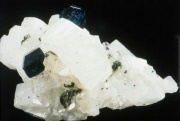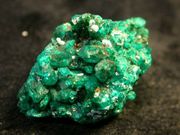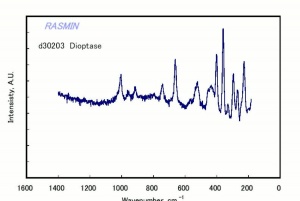Difference between revisions of "Dioptase"
Jump to navigation
Jump to search
(username removed) |
|||
| (5 intermediate revisions by 3 users not shown) | |||
| Line 2: | Line 2: | ||
== Description == | == Description == | ||
| − | An emerald green copper silicate mineral that has been used as a [ | + | An emerald green copper silicate mineral that has been used as a [[gemstone]] since Greco-Roman times. The prismatic dioptase crystals are found in large clumps which tend to fracture unevenly. Dioptase is found usually near copper deposits and occurs in Russia, Congo, Central African Republic, South West Africa, Zaire, Chile, and the United States (Arizona). |
| − | + | [[File:pd30203dioptase.jpg|thumb|Dioptase]] | |
== Synonyms and Related Terms == | == Synonyms and Related Terms == | ||
| Line 10: | Line 10: | ||
[[[SliderGallery rightalign|dioptaseRS.jpg~Raman]]] | [[[SliderGallery rightalign|dioptaseRS.jpg~Raman]]] | ||
| − | == | + | ==Physical and Chemical Properties== |
| − | Hexagonal crystal system with prismatic crystals. Cleavage is perfect in three directions. Fracture = conchoidal and brittle Luster = vitreous. Streak = pale greenish-blue. | + | * Hexagonal crystal system with prismatic crystals. |
| + | * Cleavage is perfect in three directions. | ||
| + | * Fracture = conchoidal and brittle | ||
| + | * Luster = vitreous. | ||
| + | * Streak = pale greenish-blue. | ||
{| class="wikitable" | {| class="wikitable" | ||
| Line 18: | Line 22: | ||
! scope="row"| Composition | ! scope="row"| Composition | ||
| CuSiO2(OH)2 | | CuSiO2(OH)2 | ||
| − | |||
| − | |||
| − | |||
|- | |- | ||
! scope="row"| Mohs Hardness | ! scope="row"| Mohs Hardness | ||
| 5.0 | | 5.0 | ||
| + | |- | ||
| + | ! scope="row"| Density | ||
| + | | 3.28-3.35 g/ml | ||
|- | |- | ||
! scope="row"| Refractive Index | ! scope="row"| Refractive Index | ||
| Line 29: | Line 33: | ||
|} | |} | ||
| − | == | + | ==Resources and Citations== |
| − | Mineralogy Database: [http://www.webmineral.com/data/Dioptase.shtml Dioptase] | + | * Mineralogy Database: [http://www.webmineral.com/data/Dioptase.shtml Dioptase] |
| − | + | * Jack Odgen, ''Jewellery of the Ancient World'', Rizzoli International Publications Inc., New York City, 1982 | |
| − | |||
| − | |||
| − | |||
| − | |||
| + | * ''Van Nostrand's Scientific Encyclopedia'', Douglas M. Considine (ed.), Van Nostrand Reinhold, New York, 1976 | ||
| − | + | * C.W.Chesterman, K.E.Lowe, ''Audubon Society Field Guide to North American Rocks and Minerals'', Alfred A. Knopf, New York, 1979 | |
| − | * | + | * Wikipedia: http://en.wikipedia.org/wiki/Dioptase (Accessed Sept. 7, 2005) |
| − | |||
| − | |||
| − | + | [[Category:Materials database]] | |
Latest revision as of 16:53, 21 July 2022
Description
An emerald green copper silicate mineral that has been used as a Gemstone since Greco-Roman times. The prismatic dioptase crystals are found in large clumps which tend to fracture unevenly. Dioptase is found usually near copper deposits and occurs in Russia, Congo, Central African Republic, South West Africa, Zaire, Chile, and the United States (Arizona).
Synonyms and Related Terms
dioptasa (Esp.); dioptase (Fr., Port.); Dioptas (Deut.); dioptaas (Ned.)
Physical and Chemical Properties
- Hexagonal crystal system with prismatic crystals.
- Cleavage is perfect in three directions.
- Fracture = conchoidal and brittle
- Luster = vitreous.
- Streak = pale greenish-blue.
| Composition | CuSiO2(OH)2 |
|---|---|
| Mohs Hardness | 5.0 |
| Density | 3.28-3.35 g/ml |
| Refractive Index | 1.65-1.71 |
Resources and Citations
- Mineralogy Database: Dioptase
- Jack Odgen, Jewellery of the Ancient World, Rizzoli International Publications Inc., New York City, 1982
- Van Nostrand's Scientific Encyclopedia, Douglas M. Considine (ed.), Van Nostrand Reinhold, New York, 1976
- C.W.Chesterman, K.E.Lowe, Audubon Society Field Guide to North American Rocks and Minerals, Alfred A. Knopf, New York, 1979
- Wikipedia: http://en.wikipedia.org/wiki/Dioptase (Accessed Sept. 7, 2005)


